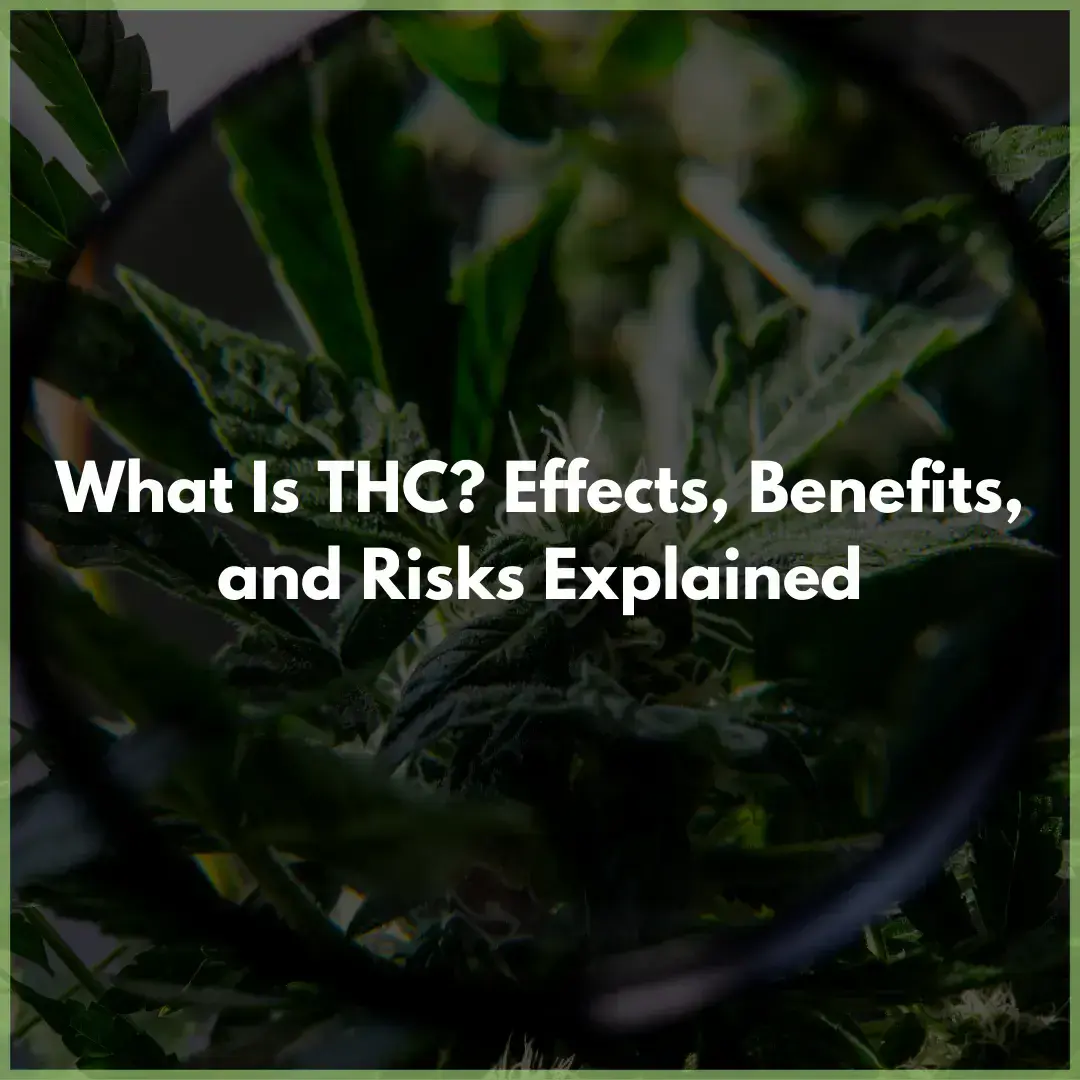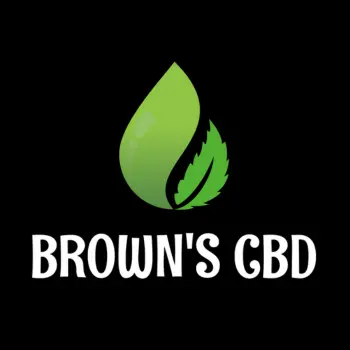
THC, or tetrahydrocannabinol, is the psychoactive compound in cannabis that gives you the high and is used for many medical conditions.
It affects the brain in many ways. This article covers what is THC, how it works, its benefits and its differences from CBD.
Key Points
- THC, or delta-9-tetrahydrocannabinol, is the main psychoactive component of cannabis, known for making you feel high and binds to cannabinoid receptors in the brain.
- While THC has medical uses, including pain relief and nausea treatment, it can also cause impairment, such as loss of motor coordination and in high doses, psychotic episodes.
- THC and CBD are different cannabinoids with different effects; THC gets you high while CBD is non-psychoactive and their legal status is different; CBD is a supplement and THC requires a prescription.
What is THC
THC is scientifically known as delta-9-tetrahydrocannabinol. It’s the main psychoactive compound in the cannabis plant.
Its chemical structure has 21 carbon atoms, 30 hydrogen atoms and 2 oxygen atoms, making it a unique compound in the broader class of cannabinoids.
The cannabis sativa plant has over 400 chemical compounds, more than 100 of which are cannabinoids, of which THC is one of the most studied.
The process of how the cannabis plant produces THC and other cannabinoids is through the synthesis of cannabinoid acids that turn into their active forms when dried and heated.
Historically, the psychoactive properties of cannabis have been known for thousands of years. But detailed scientific study, especially on THC, only emerged in the late 19th century.
Today, THC is the mind-altering chemical in cannabis, known for making you feel high and helping with medical conditions.
Looking at the full spectrum of cannabinoids in the cannabis plant shows that each one contributes to the overall effect of the plant, with THC standing out because of its psychoactive properties.
Supplemental full spectrum cannabidiol oil contains all of the plant’s compounds, with THC levels within legal limits.
How THC Affects the Brain
THC affects the brain through specific cannabinoid receptors that are part of the endocannabinoid system, a vital system for many physiological functions.
When THC enters the body, it binds to these receptors, especially those in the regions of the brain associated with mood, memory and motor coordination.
This affects neurotransmitter release and is why THC is known for the range of effects it has. For example, it can change your mood, enhance your senses and impair your motor skills.
The psychoactive effects of THC, such as feeling high and altered perception, come from this complex interaction in the brain.
These effects aren’t limited to the brain. The central nervous system also plays a role in transmitting the sensations and experiences caused by THC.
Now, let’s look at the short-term effects of THC and how they manifest in the body.
Short-Term Effects of THC
A well-known short-term effect of THC is euphoria. This feeling of intense happiness and relaxation is what many users seek when consuming THC.
Along with euphoria, THC can also cause sensory alterations, such as visual and auditory enhancements.
But it’s not all good. Impaired motor coordination is a short-term effect of THC, making tasks such as driving or operating machinery a higher risk.
High doses of THC can also cause extreme psychotic episodes in some individuals. These can include paranoia, hallucinations and severe anxiety.
The method of consumption affects how fast these effects are felt.
When THC is smoked, it’s absorbed from the lungs into the bloodstream and takes effect within minutes. This rapid onset is why smoking is one of the most popular ways to consume THC.
Medical Uses of THC
Medical marijuana is increasingly recognised for its potential to treat many health conditions. THC is used to help with nausea, stimulate appetite, relieve pain and treat insomnia.
Dronabinol and Nabilone are FDA-approved synthetic forms of THC used to treat chemotherapy-induced nausea and vomiting and stimulate appetite in AIDS or anorexia patients.
Recent studies are exploring THC’s benefits for fibromyalgia and chronic pain. These studies suggest that THC may help with symptoms that are hard to treat with traditional medications.
In the UK, THC-based medical cannabis products are available for many health issues.
Research is still uncovering THC’s full potential for medical use. Healthcare professionals are recognising the benefits of THC, and it’s becoming a part of modern medicine.
THC vs CBD: Key Differences
Although both THC and Cannabidiol oil come from the cannabis plant, they are very different.
THC makes you feel high, a notable psychoactive effect not present with CBD. THC and CBD both interact with the body’s endocannabinoid system but target different brain receptors.
This difference in interaction causes different effects on the body and mind. For example, while THC can change perception and mood, CBD is used for its calming and anti-inflammatory properties.
Although they are different, both cannabinoids have medical benefits like pain relief. This shared benefit makes both CBD and THC useful for different therapeutic purposes.
The legal status of THC and CBD Oil varies. CBD products, such as cannabidiol patches, are legally available as supplements and cosmetics in the UK, while THC is a controlled substance and only available via prescription.
This difference highlights the different regulatory approach to these cannabinoids at the federal level.
Synthetic THC and Its Uses
The FDA has approved synthetic THC formulations like Nabilone (Cesamet) and Dronabinol (Marinol, Syndros) for medical use.
These synthetic cannabinoids mimic the effects of natural THC, providing a consistent and controlled dosage for medical treatments.
The effects of synthetic THC can last from 1 to 6 hours. This duration of effects makes synthetic THC a useful tool for managing symptoms that require prolonged relief.
Knowing the uses and risks of synthetic THC is important for informed medical and therapeutic applications.
As with natural THC, synthetic cannabinoids should be used under medical supervision to avoid potential side effects.
Conclusion
In summary, THC is a powerful compound with many effects on the brain and body.
From its short-term psychoactive effects to its medical uses, THC is part of both recreational and medical cannabis.
Understanding the difference between THC and CBD, and the benefits and risks of synthetic THC is important for making informed decisions about cannabis use.
As we continue to explore the therapeutic potential of THC, we must stay informed and approach its use responsibly.
The future of medical cannabis is bright, and research will uncover more benefits of this amazing compound.
Frequently Asked Questions
THC, or delta-9-tetrahydrocannabinol, is the main psychoactive component in cannabis, known for its euphoric effects. This compound is responsible for the high associated with marijuana use.
THC interacts with cannabinoid receptors in the brain, influencing neurotransmitter release, which can change mood, memory and motor coordination. This interaction shows its impact on brain function.
Euphoria, increased sensory perception, impaired motor coordination, psychotic reactions at high doses. Use with caution.
Nausea, appetite stimulation, pain relief, fibromyalgia and chronic pain. Useful for many patients.
THC gets you high, CBD doesn’t. Both have medical benefits, just different ways of interacting with the body.

